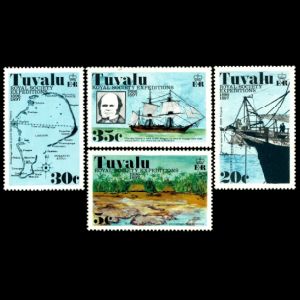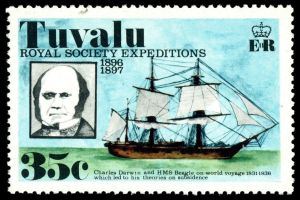the place where Paleontology and Paleoanthropology meets Philately
Tuvalu
Charles Darwin on stamps of Tuvalu
| << previous country | back to index | next country >> |
Contents:
- Country overview
- Philately of Tuvalu
- Official stamps of Tuvalu related to Paleontology
- References
- Acknowledgements
Tuvalu, formerly known as the Ellice Islands, is a Polynesian island nation located in the Pacific Ocean, midway between Hawaii and Australia.
It comprises three reef islands and six true atolls. Tuvalu has a population of about 11,000. The total land area of the islands of Tuvalu is 26 square kilometres.
In 1568, Spanish navigator Álvaro de Mendaña was the first European to sail through the archipelago, sighting the island of Nui during his expedition in search of Terra Australis.
In 1819 the island of Funafuti was named Ellice's Island; the name Ellice was applied to all nine islands after the work of English hydrographer Alexander George Findlay.
The islands came under Britain's sphere of influence in the late 19th century, when each of the Ellice Islands was declared a British Protectorate by Captain Gibson of HMS Curacoa between 9 and 16 October 1892.
The Ellice Islands were administered as British protectorate by a Resident Commissioner from 1892 to 1916 as part of the British Western Pacific Territories (BWPT), and then as part of the Gilbert and Ellice Islands colony from 1916 to 1974.
A referendum was held in December 1974 to determine whether the Gilbert Islands and Ellice Islands should each have their own administration.
As a consequence of the referendum, the Gilbert and Ellice Islands colony ceased to exist on 1 January 1976 and the separate British colonies of Kiribati and Tuvalu came into existence.
Tuvalu became fully independent within the Commonwealth on 1 October 1978. [R1]
The Tuvalu Philatelic Bureau was established on 1 January 1976. The first postage stamp cancellation devices were put into use the same day.
In the late 1980s, Tuvalu became involved in a court case with Clive Feigenbaum, who was the Chairman of the Philatelic Distribution Corporation (P.D.C.).
The legal case made claims in relation to a contract with the government of Tuvalu relating to allegations as to the deliberate production of stamps with errors for sale to collectors at inflated prices.
According to the New York Times, "P.D.C. produced 14,000 deliberate errors: stamps with inverted centres, missing elements or perforation varieties, which it sold for inflated prices". [R2]
Official stamps of Tuvalu related to Paleontology and Paleoanthropology: Charles Darwin
| 02.11.1977 "Royal Society Expeditions" [1] | ||

|
|
|
Notes:

|
| Charles Darwin on stamps of Tuvalu 1977 MiNr.: 57, Scott: 57. |
Initially, reefs grown around the margins of a volcano at sea level. Over time, as the volcanic massif cools – it subsides (sinks), eventually sinking below the water.
Coral reefs will continue to grow to maintain their position near sea level – where they can be washed over by waves bringing them nutrients.
After the volcano sinks beneath the water, the reef system around the volcano forms an atoll.
The island of Funafuti was one of the places where a later expedition (1897) tested Darwin’s theory – by drilling borings into the rock to collect samples at depth – showing that the reef limestones overlaid volcanic rocks. [R3]
Charles Darwin (1809 -1882)
was an English naturalist, geologist and biologist, best known for his contributions to the theory of evolution.
His proposition that all species of life have descended from a common ancestors,
was published in his most famous book "On the Origin of Species" in 1859.
This theory is now widely accepted and considered a fundamental concept in all biological science,
including paleontology.
References:
- [R1] Tuvalu: Wikipedia, FlagCounter
- [R2] Postal History and Philately of Tuvalu:
Wikipedia
Links to official website of the Post Authority, stamp catalog and a list of new stamps of Tuvalu are here - [R3] Funafuti: "Funafuti; Or Three Months on a Coral Island: An Unscientific Account of a Scientific Expedition" by Janet William Edgeworth David, published in 1899, on World Digital Library (PDF 122Mb),
Acknowledgements:
Many thanks to Dr. Peter Voice from Department of Geological and Environmental Sciences, Western Michigan University, for reviewing the draft page and his valuable comments.
| << previous country | back to index | next country >> |